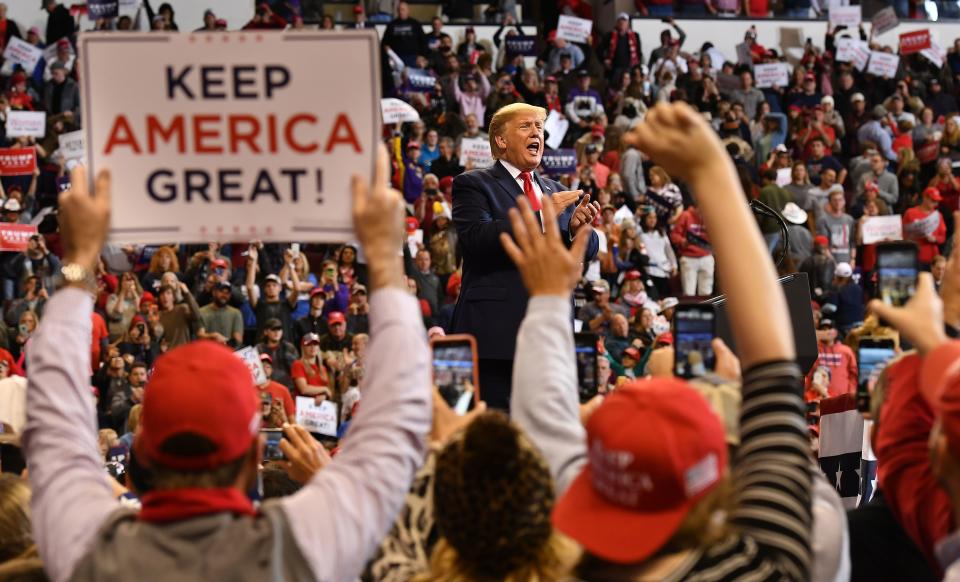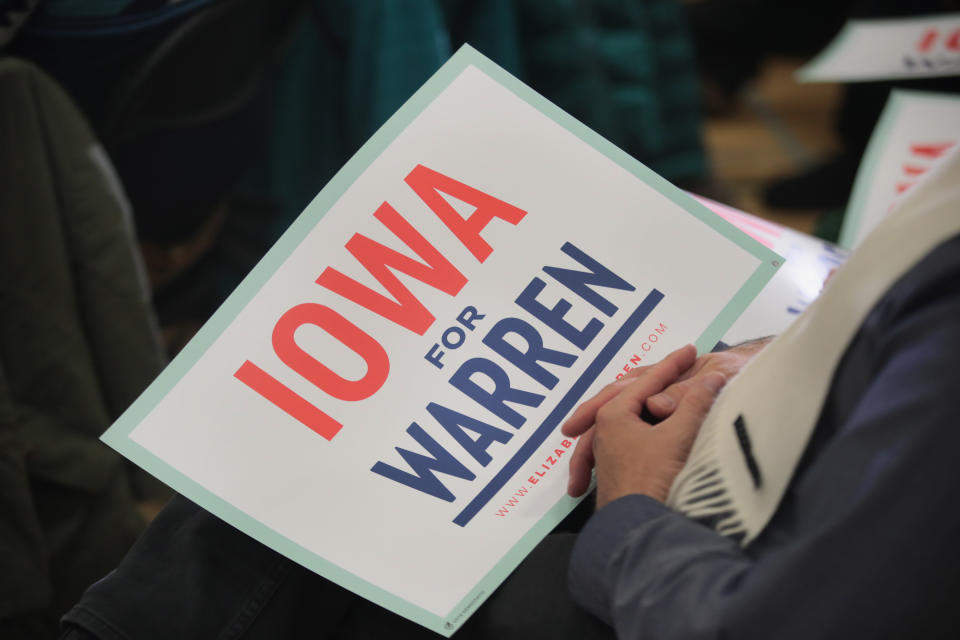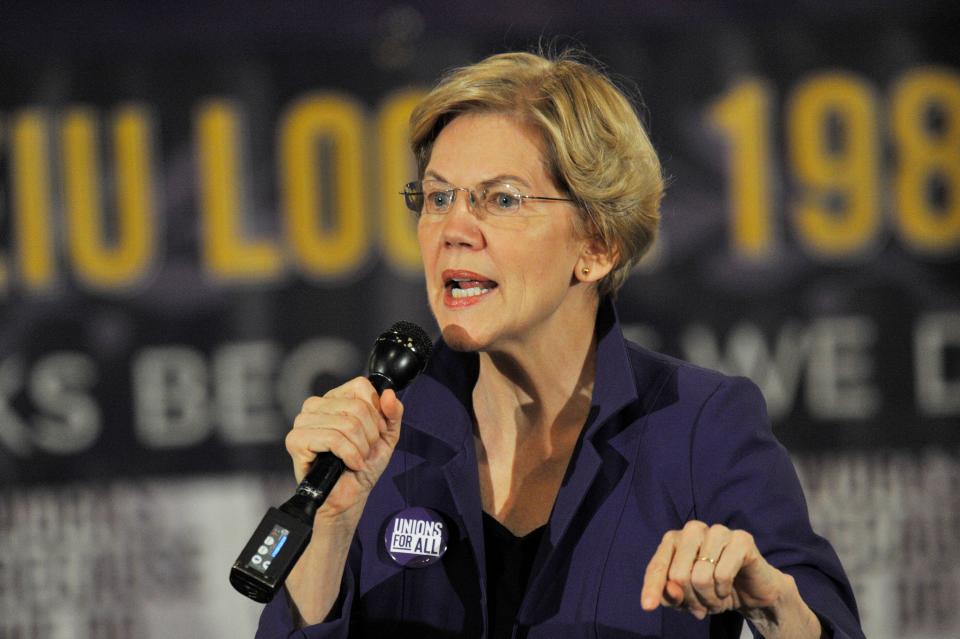The real danger of impeachment for Trump and Dem candidates: It's the calendar
Welcome to 2020 Vision, the Yahoo News column covering the presidential race with one key takeaway every weekday and a wrap-up each weekend. Reminder: There are 77 days until the Iowa caucuses and 351 days until the 2020 election.
Much fuss has been made in the media about the potential downsides of impeachment for both President Trump and the Democrats vying to replace him in the White House. Will Trump’s approval rating plummet even further amid continuing revelations about his Ukrainian pressure campaign? Or will voters come to see impeachment as a purely partisan exercise and punish the Democrats accordingly?
At this point, however, it’s becoming clear that the real problem with impeachment isn’t the loss of a few percentage points in the polls for either side; public opinion seems to have calcified in its usual polarized form, with roughly 48 percent of the country supportive of impeachment and roughly 46 percent opposed.
The real problem for Trump and his would-be 2020 rivals is the loss of something even more precious and irrevocable than polling percentage points: time.
On Wednesday, the Washington Post reported that despite earlier GOP calls for a swift, pro forma Senate process — and continuing efforts by some Trump allies to dismiss any potential charges altogether — Republican senators and their advisers are “privately discussing whether to pressure GOP leaders to stage a lengthy impeachment trial beginning in January.” Their goal, according to more than a dozen participants in the discussions? To “scramble the Democratic presidential race.”
“That might be a strategy,” Wisconsin Sen. Ron Johnson told the Post, flashing what the paper described as “a coy smile.”

The strategy is based on a simple premise: You can’t be in two places at once. With the Iowa caucuses on Feb. 3 and the New Hampshire primary on Feb. 11 — and Nevada and South Carolina following later that month — all the Democratic presidential hopefuls have been counting on spending January crisscrossing the early states, delivering their closing arguments.
But the Senate rules for an impeachment trial are very strict: To participate, senators must sit attentively at their desks every afternoon except Sunday.
That means that for the duration of the trial, the six Democratic senators currently running for president — Elizabeth Warren, Bernie Sanders, Kamala Harris, Amy Klobuchar, Cory Booker and Michael Bennet, all of whom have confirmed that they intend to participate — won’t be able to campaign in Iowa, New Hampshire or anywhere else, and they won’t have much free time to raise money either, by phone or in person.
“I guess I’m just going to have to try to be in Washington, D.C., in Des Moines, Iowa, and Concord, N.H., at the same time,” Sanders dejectedly told ABC. “I will do my best.”
To be sure, the timing of any Senate trial is far from settled; the New York Times reported Thursday that Republicans remain “conflicted about how quickly to move.” And not every top-tier Democrat would suffer if the GOP decides to devote all of January (and possibly beyond) to impeachment. “Pete Buttigieg and Joe Biden might like that,” Texas Sen. John Cornyn told the Post, referring to the two frontrunning Democrats who would virtually have Iowa and New Hampshire to themselves.

Still, many Senate Republicans seem delighted by the scheme.
They should probably be careful what they wish for. Why? Because the longer impeachment drags out, the more it could damage Trump as well. It’s not just that a longer trial means more time for new information to emerge and sink in with the public. It’s that every day spent battling impeachment is another day not spent taking advantage of the power of incumbency to set the 2020 agenda and drive a reelection message while Democrats are squabbling among themselves.
Consider the 2012 cycle. On Labor Day 2011, Barack Obama’s approval rating was as low as Trump’s is now: about 41 percent. Polls showed him losing to a generic Republican in every battleground state. But by December of that year, Obama had clawed his way back up to 49 percent — and that is roughly where he wound up the following November, when he won reelection with 332 votes in the Electoral College.
“For all the things that happened in 2012 — debates, gaffes, etc. — the most work that was done to get Obama reelected happened in the fall of 2011,” Obama’s former senior adviser Dan Pfeiffer recalled on a recent episode of “Pod Save America.” “He had a clear lane because the Republicans were fighting with each other. … They were going as far to the right on immigration as they could, and Obama was out there just talking about the economy [and] being president.”
“Trump and the Republicans are now spending that time [fighting] impeachment,” Pfeiffer added. “In that sense, Trump is losing his best opportunity to gain strength against a divided Democratic Party.”
In other words, you can always recapture a few points in the polls. But once time is gone, it’s gone forever — no matter which side of the impeachment divide you’re on.

With November debate field set, the scramble is underway for places at the next one
This week brings not just three more days of impeachment hearings but also the fifth Democratic primary debate. The field for the gathering in Atlanta consists of former Vice President Joe Biden, Sens. Elizabeth Warren, Bernie Sanders, Kamala Harris, Amy Klobuchar and Cory Booker, South Bend, Ind., Mayor Pete Buttigieg, Rep. Tulsi Gabbard, Tom Steyer and Andrew Yang. Those who participated in last month’s but won’t be in this one are former Rep. Beto O’Rourke, who dropped out of the race, and former Housing Secretary Julián Castro, who fell short of the polling threshold. The debate is set to air on MSNBC from 9 p.m. to 11 p.m. and will include moderators from both the network and the Washington Post.
Of the 10 candidates who’ve qualified for this week’s debate, six have already locked in spots on the stage for December as well (Biden, Warren, Sanders, Buttigieg, Harris, Klobuchar). Yang has reached the donor threshold but still needs more qualifying polls, while Booker, Gabbard and Steyer need to improve on both fundraising and polling.

Warren continues her feud with billionaires
While Sen. Elizabeth Warren has generally avoided sparring with her Democratic primary rivals, her campaign is happy to continue a feud with its favorite antagonists: billionaires.
Warren’s rising stature in the Democratic primary has prompted a number of America’s 607 billionaires to break out in a sweat over the possibility she might win the nomination and someday be in a position to impose (with the — unlikely, as things now appear — consent of Congress) her proposed wealth tax, which would cost, as one example, Amazon chief Jeff Bezos $6.7 billion, based on his current worth of $112 billion. One particular foil has been hedge fund mogul Leon Cooperman, who sent Warren a five-page letter in October decrying her “vilification of the rich” as “misguided.” A few days after his letter, Cooperman went on CNBC and held back tears when discussing the idea of a Warren presidency.
Her campaign’s response was to start selling mugs labeled “Billionaire Tears” on her campaign website.
“In November 2019, billionaire and former Goldman Sachs executive Leon Cooperman (who as recently as 2017 settled with the SEC on insider-trading charges) was brought to tears on live television while discussing the prospect that a President Elizabeth Warren might require him to pay his fair share in taxes,” reads the come-on for the $25 mug/campaign donation. “Savor a warm, slightly salty beverage of your choice in this union-made mug as you contemplate all the good a wealth tax could do: universal childcare, student debt cancellation, universal free college, and more.”
Warren’s campaign also cut a new ad to air on CNBC titled “Elizabeth Warren Stands Up to Billionaires,” which includes clips of billionaires — including Cooperman and Goldman Sachs executive Lloyd Blankfein — discussing the Massachusetts senator in unflattering terms. Cooperman did not take kindly to the new video.
“In my opinion she represents the worst in politicians as she’s trying to demonize wealthy people because there are more poor people than wealthy people,” Cooperman told CNBC. “As far as the accusations of insider trading, I won the case. She’s disgraceful. She doesn’t know who the f*** she’s tweeting. I gave away more in the year than she has in her whole f***ing lifetime.”
Cooperman settled with the SEC in 2017 but did not admit any wrongdoing, paying $5 million in fines and forfeited profits. The more severe sanction of a ban from working in the securities industry was not part of the settlement.

Sanders gets healthy after heart scare
After an early October heart attack that knocked him off the trail, Bernie Sanders has had a strong few weeks. The 78-year-old earned the endorsements of Reps. Alexandria Ocasio-Cortez, Ilhan Omar and Rashida Tlaib, held a number of well-attended rallies and watched his polling averages in Iowa and New Hampshire creep up. But Sanders — with some pushing from his wife, Jane — is turning to a healthier lifestyle on the trail six weeks after having stents inserted, according to a New York Times story published Wednesday.
“We’re getting better eating habits and making sure we can maintain them on the road,” said Jane Sanders. “For him and for me, and for everybody else on the campaign.”
“I’ve noticed him ordering a heck of a lot more salads,” said campaign manager Faiz Shakir.
In addition to getting in more walks, Sanders has swapped out Outback Steakhouse fare and diner food for grilled fish, soups and salads. Cory Booker, one of Sanders’s Senate colleagues and an outspoken advocate of a vegan diet, tweeted out an excerpt from the Times piece that noted that Sanders had recently eaten a vegan breakfast with the annotation “You love to see it.”
_____
Download the Yahoo News app to customize your experience.
Read more from Yahoo News:





